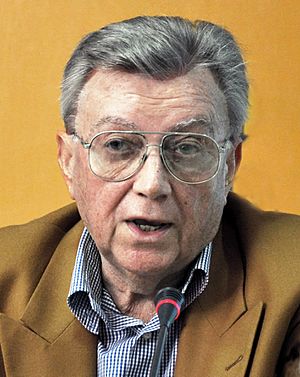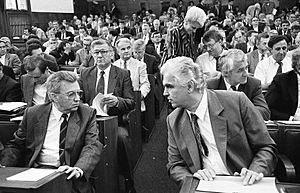Borisav Jović facts for kids
Quick facts for kids
Borisav Jović
|
|
|---|---|

Jović in 2009
|
|
| 12th President of the Presidency of Yugoslavia | |
| In office 15 May 1990 – 15 May 1991 |
|
| Prime Minister | Ante Marković |
| Preceded by | Janez Drnovšek |
| Succeeded by | Sejdo Bajramović (Acting) |
| 12th Secretary General of Non-Aligned Movement | |
| In office 15 May 1990 – 15 May 1991 |
|
| Preceded by | Janez Drnovšek |
| Succeeded by | Stjepan Mesić |
| 3rd Serbian Representative in the Yugoslav Presidency | |
| In office 15 May 1989 – 27 April 1992 |
|
| Preceded by | Nikola Ljubičić |
| Succeeded by | Office abolished |
| Personal details | |
| Born | 19 October 1928 Nikšić, Batočina, Kingdom of Serbs, Croats and Slovenes |
| Died | 13 September 2021 (aged 92) Belgrade, Serbia |
| Political party | Socialist Party of Serbia |
Borisav Jović (born October 19, 1928 – died September 13, 2021) was a Serbian economist, diplomat, and politician. He served as the President of Yugoslavia's collective leadership from 1990 to 1991.
Before this, he was Yugoslavia's ambassador to Italy in the 1970s. He also represented Serbia in the Yugoslav Presidency. Later, he became a key figure in the Socialist Party of Serbia during the 1990s. Jović earned his PhD in economics from the University of Belgrade in 1965. He could speak both Russian and Italian fluently.
His Career and Role in Yugoslavia
Jović was a close friend and advisor to Serbian official Slobodan Milošević. He helped Milošević gain power during a time of big political changes in Yugoslavia. Jović was the chairman of the Yugoslav Presidency from May 1990 to May 1991.
In his book, Jović wrote about a suggestion he made in June 1990. After some parts of Yugoslavia, like Slovenia and Croatia, voted for independence, he suggested that these areas should leave Yugoslavia. He also thought that Serb-populated parts of Croatia should stay. Milošević agreed with this idea.
Jović is also known for helping to work out the Brioni Accord in July 1991. This agreement helped Slovenia gain its independence after a short conflict called the Ten-Day War.
Near the end of his time as president, his planned successor, Stjepan Mesić from Croatia, was blocked from taking the role. This went against the country's rules for rotating leaders. In mid-1991, as tensions grew in Croatia, Jović tried to give the army more power. This plan would have allowed the army to take control of the country. A vote was needed from 5 out of 8 members of the Presidency. Serbia controlled the votes of Serbia, Montenegro, Vojvodina, and Kosovo. They expected the Serb representative from Bosnia and Herzegovina to vote for the plan. However, this plan did not work because the Bosnian Serb delegate, Bogić Bogićević, voted against it.
In a 1995 BBC documentary called The Death of Yugoslavia, Jović talked about how he saw the events that led to the breakup of the Socialist Federal Republic of Yugoslavia. He also gave his testimony to a special court, the International Criminal Tribunal for the former Yugoslavia (ICTY). Jović explained some of the decisions made by Yugoslav leaders that led to the creation of the Bosnian Serb Army. He said that he and Serbian President Milošević decided to move all Yugoslav army soldiers from Serbia, Montenegro, and Bosnia and Herzegovina back to their home areas. This way, Bosnian Serb soldiers from the Yugoslav army became part of the new Bosnian Serb Army.
Jović believed that Ante Marković, who was the former Yugoslav Prime Minister, was responsible for the country's problems. He saw Marković as being influenced by Western countries.
After the conflicts, Jović was interviewed by the ICTY. He was not charged with any crimes. Instead, he was called as a witness and shared what he knew about Milošević's actions during that time.
His Final Years
Borisav Jović passed away from COVID-19 on September 13, 2021. He was 92 years old.
See also
 In Spanish: Borisav Jović para niños
In Spanish: Borisav Jović para niños
 | James Van Der Zee |
 | Alma Thomas |
 | Ellis Wilson |
 | Margaret Taylor-Burroughs |


